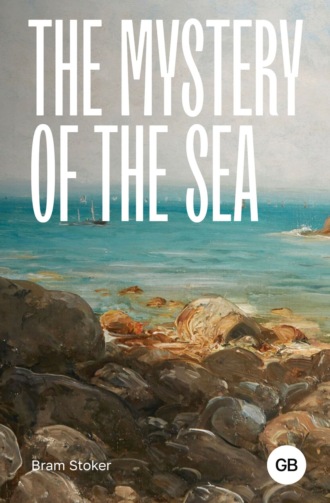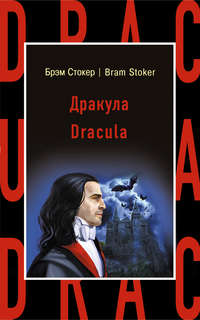
Полная версия
The Mystery of the Sea / Тайна моря
“Hush! oh hush! Do not say anything, dear. You will only frighten yourself. Be brave!” and such phrases of kindness and endearment. Once the girl stopped as a wave bigger than the rest broke over her feet. The old lady tried to still her shriek into a moan as she held on to her, saying “Oh Miss Anita! Oh Miss Anita!” plaintively over and over again.
At last we had ravelled the four strands of the rope and I began to knot them together. The result was a rope long enough to reach from rock to rock, though it was in places of very doubtful strength. I made a big loop at one end of it and put it over the stout lady's head and under her armpits. I cautioned both women not to tax the cord too severely by a great or sudden strain. The elder lady protested against going first, but was promptly negatived by the young lady, whose wishes on the subject were to me a foregone conclusion. I took the loose end of the rope and diving into the water swam across to the other rock upon the top of which I scrambled with some little trouble, for the waves, though not as yet in themselves dangerous, made difficult any movement which exposed me to their force. I signed to the old lady to slide into the sea which, assisted by the girl, she did very pluckily. She gasped and gurgled a good deal and clutched the loop with a death grip; but I kept a steady even strain on the rope whose strength I mistrusted. In a few seconds she was safely across, and I was pulling her up by the hands up the rock. When she was firmly fixed I gave her the loose end of the cord to hold and swam back with the loop. The girl did not delay or give any trouble. As she helped me up the rock I could not but notice what strength she had; her grip of my wet hand was firm and strong, and there was in it no quiver of anxiety. I felt that she had no care for herself, now that her companion was safe. I signalled to the old lady to be ready; the girl slipped into the water, I going in at the same time and swimming beside her. The old lady pulled zealously. So absorbed was she in her work that she did not heed my warning cry not to pull too hard. She pulled as though on her strength rested the issue of life and death; with the result that before we were a third of the way across the rope broke and she fell sitting on the rock behind her. For an instant the girl was submerged and came up gasping. In the spasmodic impulse common at such moments she gripped me so hard round the neck that I felt we were both in danger. Before we sank I wrenched, though with some difficulty her hands away from me, so that when we rose I had her at arm's length. For a few seconds I held her so that she could get her breath; and as I did so I could hear the old lady screaming out in an agonised way:
“Marjory! Marjory! Marjory!” With her breath came back the girl's reason, and she left herself to me passively. As I held her by the shoulder, a wave sweeping over the rock took us, and in my sudden effort to hold her I tore away the gown at her throat. It was quite evident her wits were all about her now for she cried out suddenly:
“Oh, my brooch! my brooch!” There was no time to waste and no time for questions. When a man has to swim for two in a choppy sea, and when the other one is a fully clothed woman, there is little to waste of strength or effort. So I swam as I had never done, and brought her up to the rock where the old lady helped her to scramble to her feet. When I had got my breath I asked her about her brooch. She replied:
“I would not have lost it for all the world. It is an heirloom.”
“Was it gold?” I asked, for I wanted to know its appearance as I intended to dive for it.
“Yes!” she said, and without another word I jumped into the channel again to swim to the outer rock, for it was close there it must have been lost and I could dive from there. The channel between the rocks has a sandy bottom, and it would be easy to see the gold. As I went she called out to me to come back, not to mind, that she would rather lose it a thousand times than have me run any risk, and so forth; things mightily pleasant to hear when spoken by such lips. For myself I had only exultation. I had got off both the women without accident, and the sea was as yet, not such as to give any concern to a good swimmer. I dived from the rock and got bottom easily, the depth being only ten or twelve feet; and after a few seconds looking round me I saw the gleam of gold. When I had risen and swam to the inner rock the two women pulled me up to my feet.
When I gave her the brooch the young lady pressed it to her lips, and turning to me with tears in her eyes said:
“Oh you brave man! You kind, brave man! I would not have lost this for anything I call mine. Thank you that you have saved our lives; and that you have saved this for me.” Then with girlish impulsiveness and unpremeditation she put up her face and kissed me.
That moment, with her wet face to mine, was the happiest of my life.
Chapter VIII. A Run On The Beach
The girl's kiss was so spontaneous and so natural that it could not convey any false impression to me. It was a manifest expression of gratitude, and that only. Nevertheless it set my heart beating and my veins tingling with delight. From that instant I did not feel quite a stranger to the giver; nor could I ever feel as quite a stranger again. Something of the same idea may have passed through the girl's mind, for she blushed and looked around her shyly; but, with a proud lifting of her head and a slight stamp of her foot on the rock, she put the matter behind her, for the present. The old lady, in the midst of her concern for her companion and herself, was able to throw a glance of disapproval on me, as though I had done something wrong; from which I gathered that the younger lady was not only very dear to her, but held in some sort of unusual respect as well. It was peculiar that she should in the midst of her present condition be able to give a thought to so trivial a thing. For though death did not now stare her in the face, she was cold and wet; the rock she stood on was hard and slippery, and the foam of the breaking waves was even now curling around her feet.
She looked about her apprehensively; she did not know whether or no we were on another isolated rock. I reassured her on this subject, and we scrambled as quickly as we could over the rocks on our way shoreward. The elder lady took up most of my time. Here and there in a difficult place, for the wind by now blew so strongly that one found it hard to balance oneself as is necessary when walking on rocks, I offered the younger my hand. At first she firmly declined; but then, manifestly thinking it churlish, she relented and let me help her. That kiss was evidently rankling in her mind.
Both the women breathed more freely when we had reached the shore and stood secure from the sea. And indeed by this time the view, as we looked back, was enough to frighten one. Great waves topped with white were rolling in from as far as we could see; dashing over the rocks, sending up here and there white towers of spray, or rolling in on the flat shore in front of us with an ominous roar. Woe betide any one who might be isolated now on any rock beyond; he would be swept off, and beaten on the rocks. The old lady groaned as she saw it, and then said audibly a prayer of thankfulness. Even the girl grew white for a moment; then, to my secret joy, unconsciously she drew closer to me. I took control of the party.
“Come,” I said, “you mustn't stand here in your wet clothes. Hurry to the hotel and get dried. You will get your death of cold. We must all run! Or hasten, at all events!” I added, as I took in the dimensions of the elder lady.
“We have left our trap at the hotel” said the younger lady as we began to walk quickly in the direction of Port Erroll.
As we were moving off it suddenly struck me that Gormala might have seen the episode of the rescue. The very thought of such a thing filled me with such dismay that I groaned aloud. Not for all the world would I have had her have a hand in this; it was too sacred-too delightful-too much apart from ordinary things! Whilst I was lost in a reverie of inexpressible sweetness for perhaps two or three seconds altogether, I was recalled to myself by the voice of the girl who came close to me:
“Are you hurt? Please tell me if you are. I am a First Aid.”
“Hurt?” I asked, surprised “not at all. What on earth makes you think so?”
“I heard you groan!”
“Oh that-” I began with a smile. Then I stopped, for again the haunting fear of Gormala's interference closed over my heart like a wet mist. With the fear, however, came a resolution; I would not have any doubt to torment me. In my glance about the shore, as we came off the rocks on to the beach, I had not seen a sign of anyone. At this part of the shore the sandhills have faded away into a narrow flat covered with bent-grass, beyond which the land slopes up directly to the higher plain. There was not room or place for any one to hide; even one lying amongst the long bents could be seen at a glance from above. Without a word I turned to the left and ran as quickly as I could across the beach and up the steep bank of the sandy plateau. With a certain degree of apprehension, and my heart beating like a trip-hammer-I had certainly taken this matter with much concern-I looked around. Then I breathed freely; there was not a sign of anyone as far as I could see. The wind, now coming fiercely in from the sea, swept the tall bent-grass till it lay over, showing the paler green of its under side; the blue-green, metallic shimmer which marks it, and which painters find it so hard to reproduce, had all vanished under the stress.
I ran back to join the ladies. The elder one had continued walking stolidly along the shore, leaving a track of wet on the half dry sand as she went; but the younger one had lingered and came towards me as I approached.
“I hope there was nothing wrong?” she asked in a most natural way.
“No,” I said it without thinking, for there was something about the girl which made me feel as if we were old friends, and I spoke to her unconsciously in this strain. “It's all right. She's not there!”
“Who?” she asked with unconsciousness of any arrière pensée, an unconsciousness similar to my own.
“Gormala!” I answered.
“And who is Gormala?” For quite a minute or two I walked on without speaking, for I wanted to think before I answered. I felt that it would be hard to explain the odd way in which the Seer-woman seemed to have become tangled up in my life; and yet I wanted to tell this girl. I feared that she might laugh at me; that she might think me ridiculous; that she might despise me; or even that she might think me a lunatic! Then again Gormala might come and tell things to her. There was no accounting for what the woman might do. She might come upon us at any moment; she might be here even now! The effect of her following or watching me had begun to tell on my mind; her existence haunted me. I looked around anxiously, and breathed freely. There was no sign of her. My eyes finally fetched up on the face of the girl… Her beautiful, dark eyes were fixed on me with interest and wonder.
“Well!” she said, after a pause, “I don't suppose I'm more inquisitive than my neighbours, but I should just like to know, right here, what's wrong with you. You looked round that time just as if you were haunted! Why did you run away that time and search round as if some one had taken a pot-shot at you and you wanted to locate him? Why did you groan before you went, and come back humming? Who is Gormala, anyhow; and why were you glad that you didn't see her? Why didn't you answer me when I asked you who she was? Why did you walk along with your head up and your eyes staring, as though you were seeing visions? And why-”
All at once she stopped, and a swift blush swept over her face and even her neck. “Oh,” she said in a low tone with a note of pathos in her voice, “I beg your pardon! my unruly tongue ran away with me. I have no right to ask so many questions-and from a stranger too!” She stopped as suddenly as she had begun.
“You might have spared me that!” I said “I know I have been rude in delaying to answer your question about Gormala; but the fact is that there are so many odd things in connection with her that I was really considering whether you would think me a fool or a lunatic if I told them to you. And you certainly would not understand why I didn't want to see her, if I didn't. And perhaps not even if I did,” I added as an afterthought. The girl's awkwardness slipped from her like a robe; the blush merged into a smile as she turned to me and said:
“This is most interesting. O! do tell me-if you don't mind.”
“I shall be delighted” I said, and I only expressed my thought. “Gormala” I began; but just then the stout lady in front of us, who was now a considerable way ahead, turned round and called to us. I could only hear “Miss Anita;” but the girl evidently understood, for she called out:
“All right! We are coming at once!” and she hurried on. It gave me a thrill of pleasure that she said “we” not “I;” it was sweet to have a part in such a comprehension. As we went she turned to me and said:
“You must tell me all about it; I shan't be happy till I hear the whole story, whatever it is. This is all too lovely and exciting. I hadn't an idea when we went out sleepily this morning that there would be so much in the day to think of afterwards.” I felt that I had taken my courage in both hands as I said:
“You'll both dine with me at the hotel, won't you. You have missed lunch and must be hungry, so we can dine early. It will be such a true pleasure to me; and I can tell you all about everything afterwards, if we can manage to get a moment alone.”
She paused, and I waited anxiously. Then she spoke with a delightful smile:
“That must be as Mrs. Jack says. But we shall see!” With this I had to be content for the present.
When we came up to her, Mrs. Jack said in a woeful way:
“Oh, Miss Anita, I don't know what to do. The sand is so heavy, and my clothes are so weighty with the wet, and my boots squish so with the water in them that I'm beginning to think I'll never be able to get warm or dry again; though I'm both warm enough and dry enough in other ways.” As she spoke she moved her feet somewhat after the manner of a bear dancing, so as to make her wet boots squeak. I would have liked to have laughed, though I really pitied the poor thing; but a glance at the concern on Miss Anita's face checked me. Very tenderly she began to help and comfort the old lady, and looked at me pleadingly to help her. “Why dear” she said “no wonder it is hard walking for you with your clothes so wringing wet,” and she knelt down on the wet sand and began to wring them out. I looked around to see what I could do to help. Just opposite, where we were the outcrop of rock on which the Hawklaw is based sent up a jagged spur of granite through the sand, close under the bent-covered hillocks. I pointed to this and we led the old lady over to it and made her sit down on a flat rock. Then we proceeded to wring her out, she all the while protesting against so much trouble being taken about her. We pulled off her spring-side boots, emptied them out and, with considerable difficulty, forced them on again. Then we all stood up, and the girl and I took her arms and hurried her along the beach; we all knew that nothing could be done for real comfort till we should have reached the hotel. As we went she said with gratitude in every note of her voice, the words joggling out of her as she bumped along:
“Oh, my dears, you are very good to me.”
Once again the use of the plural gave me pleasure. This time, however, it was my head, rather than my heart, which was affected; to be so bracketted with Miss Anita was to have hope as well as pleasure.
Things were beginning to move fast with me.
When we got to Cruden there was great local excitement, and much running to and fro on the part of the good people of the hotel to get dry clothes for the strange ladies. None of us gave any detail as to how the wetting took place; by some kind of common consent it was simply made known for the time that they had been overtaken by the tide. When once the incomplete idea had been started I took care not to elaborate it. I could see plainly enough that though the elder lady had every wish to be profuse in the expression of her gratitude to me, the younger one not only remained silent but now and again restrained her companion by a warning look. Needless to say, I let things go in their own way; it was too sweet a pleasure to me to share anything in the way of a secret with my new friend, to imperil such a bliss by any breach of reticence. The ladies were taken away to bedrooms to change, and I asked that dinner for the three of us might be served in my room. When I had changed my own clothes, over which operation I did not lose any time, I waited in the room for the arrival of my guests. Whilst the table was being laid I learned that the two ladies had come to the hotel early in the day in a dogcart driven by the younger one. They had given no orders except that the horse should be put up and well cared for.
It was not long before the ladies appeared. Mrs. Jack began to express her gratitude to me. I tried to turn it aside, for though it moved me a little by its genuineness, I felt somewhat awkward, as though I were accepting praise under false pretences. Such service as I had been able to render, though of the utmost importance to them, had been so easy of execution to me that more than a passing expression of thanks seemed out of place. After all I had only accepted a wetting on behalf of two ladies placed in an awkward position. I was a good swimmer; and my part of the whole proceeding was unaccompanied by any danger whatever, I thought, of course, had it been later in the coming of the storm, things might have been very different. Here I shuddered as my imagination gave me an instantaneous picture of the two helpless women in the toils of the raging sea amongst those grim rocks and borne by that racing tide which had done poor Lauchlane Macleod to death. As if to emphasise my fears there now came a terrific burst of wind which seemed to sweep over the house with appalling violence. It howled and roared above us, so that every window, chimney and door, seemed to bear the sound right in upon us. Overhead was heard, between the burst which shook the windows and doors, that vague, booming sound, which conveys perhaps a better sense of nature's forces when let loose, than even the concrete expression of their violence. In this new feeling of the possibilities of the storm, I realised the base and the truth of the gratitude which the ladies felt; and I also realised what an awful tragedy might have come to pass had I or some one else not come down the path from Whinnyfold just when I did.
I was recalled to myself by an expression of concern by Mrs. Jack:
“Look how pale he has got. I do hope he has not been hurt.” Mechanically I answered:
“Hurt! I was never better in my life,” then I felt that my pallor must have left me and that I grew red with pleasure as I heard Miss Anita say:
“Ah! I understand. He did not have any fear for himself; but he is beginning to feel how terrible it was for us.” The fulness of understanding on the part of the beautiful girl, her perfect and ready sympathy, the exactness of her interpretation of my mind, made for me an inexpressible pleasure.
When I told Mrs. Jack that I had ventured to claim them both as my guests, and hoped that they would honour me by dining with me, she looked at her companion in the same inquiring way which I had already noticed. I could not see the face of the younger lady at the moment as it was turned away from me, but her approval was manifest; the answer was made gladly in the affirmative. Then I put forth a hope that they would allow me to have a carriage ready to take them home, whenever they might desire, so that they might feel at ease in remaining till they had been thoroughly restored after their fatigue. I added that perhaps it would be good for Miss Anita. Mrs. Jack raised her eyebrows slightly, and I thought there was a note of distance in her voice, as though she resented in a quiet way my mentioning the name:
“Miss Anita!” she said; and there was that unconscious stiffening of the back which evidences that one is on guard. I felt somewhat awkward, as though I had taken a liberty. The younger lady saw my difficulty, and with a quick smile jumped to the rescue.
“Oh Mrs. Jack” she said “I quite forgot that we were never introduced; but of course he heard you mention my name. It was rather hurried our meeting; wasn't it? We must set it right now.” Then she added very demurely:
“Dear Mrs. Jack, will you present to Miss Anita, Mr.-” she looked at me interrogatively.
“Archibald Hunter” I said, and the presentation was formally made. Then Miss Anita answered my question about the carriage:
“Thank you for your kind offer, Mr. Archibald Hunter” I thought she dwelt on the name, “but we shall drive back as we came. The storm will not be quite so bad inland, and as it does not rain the cart will be all right; we have plenty of wraps. The lamps are good, and I know the road; I noted it well as we came. Is not that right?” she added, turning to her companion.
“Quite right, my dear! Do just as you like,” and so the manner of their going was arranged.
Then we had dinner; a delightful, cosy meal. The fire leaped whenever the wind roared; and as the darkness of the storm made a sort of premature nightfall, it gave a pleasant, homely look to everything. After dinner we sat round the fire, and I think for a time we were all content. To me it was so like a dream. To sit there close to the beautiful stranger, and to think of the romantic beginning of our acquaintance, was enjoyment beyond words. As yet I did not dare to cast a glance forwards; but I was content to wait for that. I had a conviction that my own mind was made up.
After a little while we all became silent. Mrs. Jack was beginning to doze in her chair, and we two young folk instinctively banded ourselves together with our youthful superiority over sleep and fatigue. I sat quite still; there was something so sweet in this organised companionship of silence that it enraptured me. I did not need Miss Anita's look of caution to remain quiet; there was something in her face, some power or quality which was as eloquent as speech. I began to think of it; and the habit of introspection, which had now become a part of my nature, asserted itself. How much of this quality I thought, was in her face, how much in my own eyes and the brain that lay behind them. I was recalled to myself by a whisper:
“I thought for a moment you were going to sleep too. Hsh!” she placed a finger on her lip a moment and then tiptoed over to the sofa; taking a soft cushion she placed it under Mrs. Jack's head, which had now fallen over sideways upon the arm of the chair. Then she sat beside me again, and bending over said softly:
“While she is asleep would you mind walking down to the beach, I want to see the waves. They must be big by now; I can hear their roaring from here.”
“I will go with delight;” I said “but you must wrap up properly. It will not do to run any chance of a chill.”
“All right, oh wise man! I obey, King Solomon! I shall wait to put on my own clothes till I get back; and you can lend me a mackie-coat if you will.” I got one of mine for her, the newest; and we walked over the sandhills to the beach.
The wind was blowing furiously. It never left off for a moment; but occasionally there were bursts of such added violence that we found it difficult to keep our feet. We clung to each other at such moments, and the very sense of the strength which enabled me to shield her somewhat from the violence of the storm, made a new feeling of love-I could not now disguise it from myself. Something went out from me to her; some subtle feeling which must, I suppose, have manifested itself in some way, how I know not, for I kept guard upon myself. For one blissful moment, possibly of forgetfulness, she clung to me as the weak cling to the strong, the clinging of selfsurrender which is equally dear to the weak and the strong, to the woman and the man. And then she drew herself sharply away from me.
There was no misunderstanding the movement; it was an intentional and conscious one, and the motive which lay behind both was her woman's mystery. I did not know much about women, but I could make no mistake as to this. Inasmuch as Providence has thought fit in its wisdom to make men and women different, it is just as well that each sex should at critical times use its own potentialities for its protection and advancement. Herein comes, in the midst of an unnatural civilisation, the true utility of instinct. Since we have lost the need of early information of the presence of game or of predatory animals or hostile men, even our instincts adapt themselves to our surroundings. Many an act which may afterwards seem the result of long and careful premeditation is, on reflection, found to be simply the result of that form of momentary impulse which is in reality a blind obedience to some knowledge of our ancestors gained through painful experience. Some protective or militant instinct whose present exercise is but a variant of its primal use. For an instant the man and the woman were antagonistic. The woman shrank, therefore it was the man's interest to advance; all at once the man in me spoke through the bashfulness and reticence of years:












